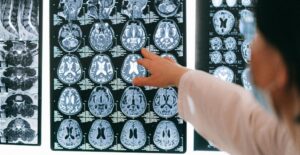
Co-Occurring Disorders
Mental Health and Addiction
A person with a substance use disorder is also at increased risk of developing other chronic diseases and disorders, such as mental illnesses. Addiction commonly co-occurs with depression, ADHD, anxiety disorders, bipolar disorder, schizophrenia, and personality disorders. For the most effective treatment, and optimal health, it is advised that both disorders be treated together as a dual-diagnosis.
Workit Health providers are able to treat co-occurring depression or anxiety for members of our clinical programs for opioid or alcohol use disorders.
How common are co-occurring disorders?
According to the Substance Abuse and Mental Health Services Administration, 9.2 million adults in the United States who have a substance use disorder also have a co-occurring disorder or dual diagnosis. The National Institute of Mental Health (NIMH) says that about half of those with addiction will also experience mental illness. But the high rate of correlation doesn’t necessarily mean that one causes the other.
Dual diagnoses aren’t only a concern for adults. Adolescents who have substance use disorders also experience high rates of co-occurring mental illness, with rates of over 60 percent. There’s a lot of variety in which substances are used and the severity of substance use. The National Institute on Drug Abuse tells us that people with schizophrenia have high rates of alcohol use and more pronounced serious mental illness, defined as having a diagnosable mental, behavior, or emotional disorder that causes serious impairment to day-to-day activities and significantly limits major life activities. Serious mental health illnesses include depression, bipolar, and schizophrenia. 1 in 4 adults with a serious mental illness also has a substance use disorder.
Data from SAMHSA’s National Survey on Drug Use and Health showed that people with co-occurring mental health and substance use disorders had a higher rate of non-medical prescription opioid use. 43 percent of people in substance use disorder (SUD) treatment for non-prescription painkillers also have symptoms of anxiety and depression.
Risk factors for co-occurring SUD and mental health disorders
NIMH indicates that there are a number of factors that explain co-occurrence:
- Genetics and environment: it is common for both substance use disorder and mental illness to run in families, suggesting that genetics may play a role. Additionally, environmental factors like stress or trauma can cause those genetics to be passed down generationally leading to the development of substance use disorder and/or mental illness.
- Substance use: mental health disorders can sometimes cause drug use or alcohol use, as people attempt to self-medicate the symptoms of mental illness. Self-medication is particularly common among those with post-traumatic stress disorder (PTSD), anxiety, and depression. Unfortunately, using those substances often makes mental health problems worse. An additional complication of substance use with mental health conditions is that drugs and alcohol can cause changes to the brain’s reward system, making it more enjoyable for the person to continue using drugs or alcohol and causing a substance abuse problem.
- Risk of further mental illness: continued substance use can lead to the development of other mental health disorders.
Diagnosis and treatment of co-occurring disorders
While drug use may initially ease symptoms of mental health distress, ultimately substance use will only exacerbate mental illness. The most effective care is an integrated treatment approach. Mental health concerns may be treated with medication and behavioral health support, and some kind of addiction treatment may be prescribed for substance use.
In approaching any treatment, a person with mental health or substance use disorders should always consult a health professional who can make the appropriate diagnosis and treatment. Because medical professionals are often specialized, this may mean seeing different experts for each condition, but these clinicians should coordinate their care.
There are a range of approaches for these co-occurring conditions, including:
- Behavioral health support: cognitive behavioral therapy, dialectical behavioral therapy, or assertive community treatment
- Medication: this may include alcohol medication, opioid medication for opioid use disorder—also referred to as medication-assisted treatment—anti-depressants, anxiety medication, or anti-psychotics for schizoaffective disorder.








